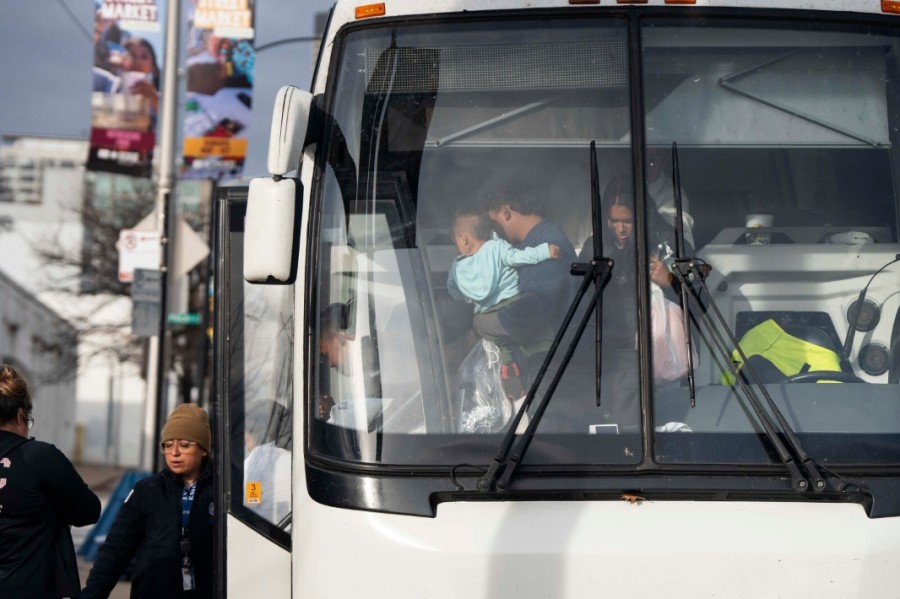More Chicago suburbs vote to restrict unscheduled migrant bus drop-offs
Several additional suburbs pass ordinances limiting when buses can drop off migrants as bus operators are turned away from Chicago.
By Michael Puente

More Chicago suburbs vote to restrict unscheduled migrant bus drop-offs
Several additional suburbs pass ordinances limiting when buses can drop off migrants as bus operators are turned away from Chicago.
By Michael PuenteSeveral Chicago suburbs have joined a growing list of area communities in adopting ordinances restricting charter buses from making unscheduled stops to drop off asylum-seeking migrants.
The cities of Joliet, Waukegan and North Chicago, along with the suburbs of Hinsdale and Buffalo Grove, each passed separate ordinances Tuesday night.
The city of Chicago is now fining and threatening to impound bus operators for failing to arrive at its landing zone for migrants between 8 a.m. and 5 p.m. weekdays. As a result, bus drivers are now heading to suburban locations, often dropping migrants off, many with children, in the wee hours of the morning, sometimes in the middle of nowhere.
“There’s nothing political about this ordinance as much as people may want that to be the case,” Buffalo Grove Village Board President Eric Smith said at Tuesday’s board meeting. “Dropping off passengers within the village without prior provisions being made for the proper housing and care of such individuals is inhumane and creates a dangerous condition and can have deadly consequences when the weather conditions are adverse.”
The ordinance in northwest suburban Buffalo Grove is similar to those passed in other communities. It requires a bus operator to give no less than five days’ notice to the town and identify who is on the bus, and how they will be cared for, housed and fed either temporarily or permanently.
Violation could subject the bus operator to $300 to $1,000 per occurrence and could include the seizure of the bus.
“The bus drop offs that have been taking place in other suburbs have put those passengers’ safety at risk,” Smith said. “If a bus were to drop off upwards of 50 passengers in an evening or a weekend, there would be no transportation to his designated landing zone. And passengers could be exposed to the elements without food, water, shelter or even knowledge of their whereabouts. The ordinance puts no burden on bus passengers. Rather, it holds the bus companies and drivers accountable for proper coordination that ensures humanitarian care when transporting passengers bound for Chicago.”
Mayor Terry D’Arcy in southwest suburban Joliet said his police department is on the lookout for buses that may be carrying migrants.
“We’ve got our police department on alert. We work with the Will County Emergency Management and we have people watching for people basically coming off the interstates and find them right away. We haven’t had any trouble,” D’Arcy said in an interview with WBEZ.
Once in Joliet, the migrants are then sent to Chicago because D’Arcy doesn’t have the resources to house them.
“We don’t have the capacity to really help out on any sort of basis. We have enough of our folks to take care of and we just don’t have the capacity to take on anymore,” D’Arcy said.
But the discussion in Joliet or Buffalo Grove on Tuesday night sometimes took on a darker tone in taking aim at illegal immigration.
“This problem is being created by our federal government and then we have other cities that are welcoming asylum-seekers, accepting funds, and now all of a sudden, it’s everybody else’s problem because they don’t want them now, which is wrong,” said Joe Clement, a Joliet City Councilman. “I support this ordinance, but I think we can take it a step further. I think we need an ordinance to let everybody know that we are not a sanctuary city.”
Clement’s comments were directly aimed at the city of Chicago and its status as a sanctuary city that does not ask people about their immigration status or disclose that information to authorities. Chicago’s sanctuary city status is one reason Texas Gov. Gregg Abbott continues to send migrants up north to Chicago and other Democrat-led cities. Abbott began busing migrants from Texas in 2022 in response to President Joe Biden’s move to end Title 42, a Trump-era policy that allowed for migrants crossing the border to quickly be returned to Mexico.
However, being a sanctuary city does not apply to nearly 30,000 migrants, mostly from Venezuela, who have made their way to Chicago legally after seeking asylum once crossing into the United States from the Mexican border.
That distinction didn’t stop those pushing for the bus restrictions to conflate the issues.
“These people are entering the country illegally,” Buffalo Grove resident Daniel Vishny said at Tuesday night’s meeting. “The number one job of the government is public safety. The village in this ordinance is looking to protect the citizens and the people on the buses.”
Speaking before the Joliet City Council, resident Tina McGrath claimed that 40% of the immigrants have criminal records without citing any evidence.
“This is a massive concern,” McGrath said. “For all you open-borders zealots, you can fill out an application to sponsor an immigrant and make sure that their bills are paid for the next 10 years.”
While both Buffalo Grove and Joliet had a few people who came out Tuesday in support of the migrants, they were greatly outnumbered by those who viewed the wave of asylum-seekers as illegal immigration.
The village of Matteson in the south suburbs passed its own measure last week that establishes regulations for “unscheduled intercity buses and the discharge of passengers,” with the Village of Oak Lawn set to take up a similar ordinance next week.
Reporter Michael Puente is part of WBEZ’s Race Class and Communities team. Follow him on X @Mikepuentenews.
